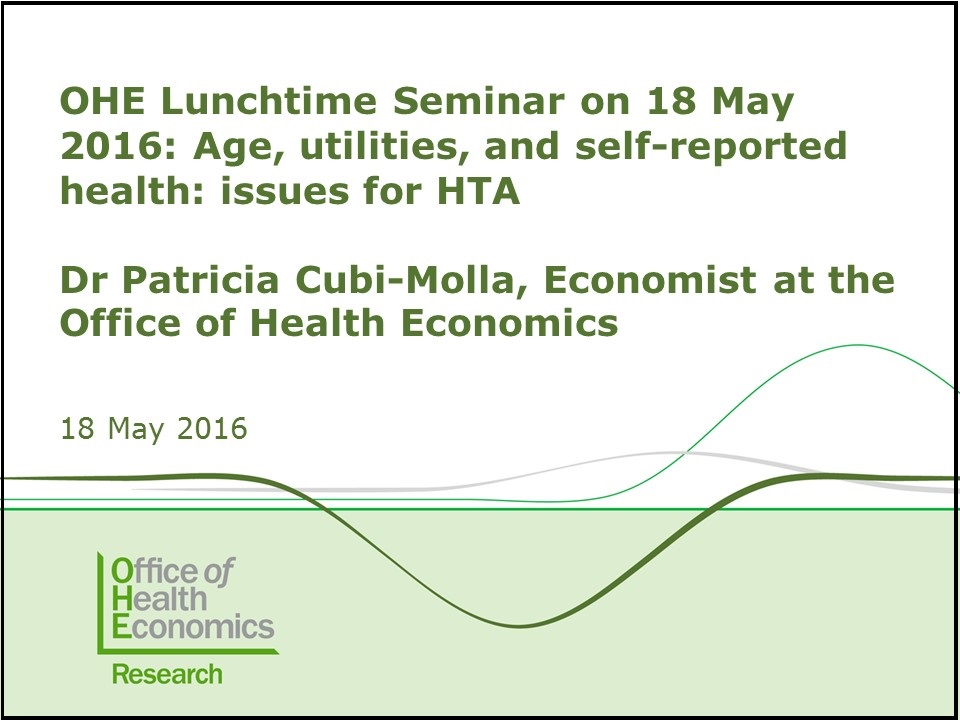On Wednesday 18th May, Dr Patricia Cubi-Molla, Economist at the Office of Health Economics, will lead an OHE Lunchtime Seminar on the topic of ‘Age, utilities, and self-reported health: issues for HTA’.
On Wednesday 18th May, Dr Patricia Cubi-Molla, Economist at the Office of Health Economics, will lead an OHE Lunchtime Seminar on the topic of ‘Age, utilities, and self-reported health: issues for HTA’.
Occasionally, in health technology assessments (HTA), the situation arises that the central estimate of patients’ HRQoL available from clinical trials exceeds that of the general population with the same age and gender. It appears unclear how HTA agencies, such as NICE, should address such an issue – should the patients’ utility scores be used in the economic evaluation of cost effectiveness, or should they be downward-adjusted to reflect their poor health relative to that of general population without the condition? The way this issue is handled has important implications for HTA and health care resource prioritisation.
This problem appears to be more likely to occur in elderly populations. One possible explanation for the patient group mean score exceeding the general population mean score is that the existence of some older people with very poor health in the general population drags down the mean. There may also be differences in the way that the same underlying state of health is interpreted by individuals of different ages. It could also be due to people of different ages having different preferences regarding health, with an individual’s views about how good or bad a given health state is reflecting their aspirations, fears and priorities, all of which may vary systematically with age. All this opens up the possibility that a technology may not be cost-effective on average but cost-effective for a sub-group whose preferences over health are more closely aligned to the benefits offered by the technology. The use of preference sub-groups can therefore increase overall health and improve efficiency by making the technology available only for the relevant sub-group, as long as that sub-group can easily be identified (such as one defined by age).
However, it is unclear whether any differences observed between age groups are driven by genuine differences in preferences or by artefacts of the technique used to elicit the preferences. Given the multitude of factors that could be driving differences in utilities, it is informative to examine the ways in which people’s valuations of hypothetical health states (e.g., using TTO) differ between methods, and from self-ratings of their own health (e.g., on the EQ VAS).
The aim of this research is to investigate several features which may explain the fact that a central estimate of HRQoL for a group of elderly patients can exceed that of the general population with the same age. Specifically, the seminar will address the following questions:
- Can we find significant differences in the variation of self-reported HRQoL values around a central estimate, when comparing different age groups?
- How do these differences (if any) depend on the central measure used (mean or median)?
- How does age affect respondents’ HRQoL valuations of hypothetical EQ-5D health states?
- What is the rationale for age-adjusting the utilities to be used in HTA? Is there a case for using utilities specific to age (or other relevant) sub-groups?
This piece of research is based on findings from a research study performed by OHE and Roche Products Ltd and funded by Roche Products Ltd. Views expressed in the seminar are those of the authors.
Patricia Cubi-Molla joined OHE in September 2015. Patricia’s main areas of research are: health-related quality of life measures, subjective well-being, cost-effectiveness thresholds, estimation of health-related outcomes, health policy evaluation, adaptation to health states, ordered choice models and theory of preferences.
Patricia obtained her PhD in Economics from the Quantitative Economics Doctorate (QED, University of Alicante) in 2009, after obtaining her BSc in Mathematics from the same university in 2002. Moving to the UK in 2009, she has been working as a Lecturer in Economics at City University London, where she has been actively involved in the Health Economics and Economic Evaluation in Health Care master programmes offered by the Department of Economics.
Further information can be obtain from Kerry Sheppard
Full invitation available here.
